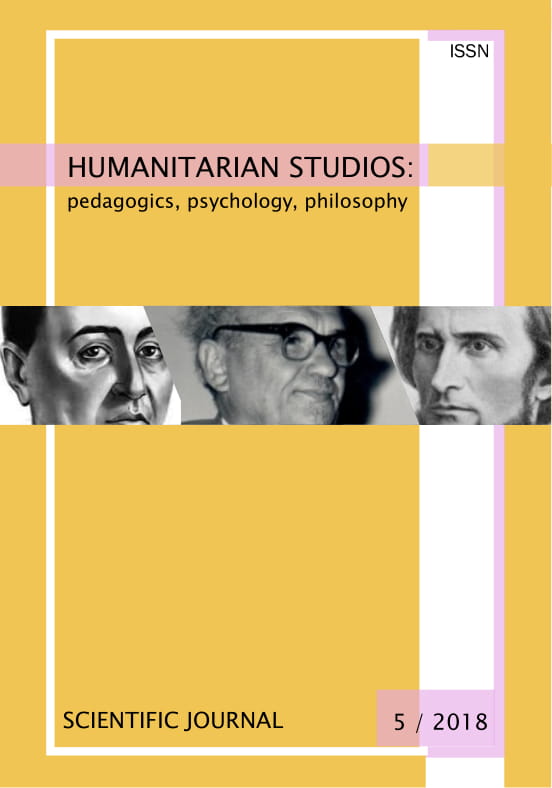From the experience of education of the legal culture of future teachers in the national university of life and environmental sciences of Ukraine
DOI:
https://doi.org/10.31548/hspedagog2019.02.056Abstract
The article provides an essential analysis of the concept of "legal culture", and also reveals the conceptual foundations of planning and features of the implementation of educational work with future teachers of the National University of Life and Environmental Sciences of Ukraine. The content and goals of education of legal culture in their consistent and logical implementation of the first to the fourth years of students learning are revealed. A comprehensive indicative plan of educational work based on system-value, person-oriented, subject-subject and activity approach is substantiated. The algorithmicity of achieving the educational goals of legal education of future teachers is shown as a priority direction, which plays the crucial role in the formation of the system of moral values. It is stated that the implementation of education of the legal culture of future teachers ensures the harmonious and diversified development of their personality. It is proposed to consider the development of a practical aspect in this problem and ways to achieve the norms of legal behavior in the education of future teachers.
References
Kultura. Pohodzhennya po-nyattya. Sutnist kulturi [Culture. The origin of the concept. The essence of culture]. URL: https://uk.wikipedia.org/wiki/Kultura
Sergeeva, T.B., Gorbatko O. I. (2006) Osobennosti korporativnoy kul-turyi obrazovatelnogo uchrezhdeniya [Features of the corporate culture of the educational institution]. Pedagogi-ka. 10. 11–21.
Vyshnevsʹkyy O. (2008) Te-oretychni osnovy suchasnoyi ukrayinskoyi pedahohiky [Theoretical foundations of modern Ukrainian ped-agogy]. K., 568.
Nikolaienko S.M., Shyn-karuk V.D., Ruden D.M., Sopivnyk R.V., Sopivnyk I.V., Petriv H.V., Kush-nir A.O., Moisieiev V.V., Davydova O.P. (2016) Prohrama vykhovannia studen-ta: «Fakhivets, hromadianyn, patriot» [Student education program «special-ist, citizen, patriot»]. Kiev: «Komprynt», 76.
Sopivnyk, R. V. (2016) Planuvannia vykhovnoi roboty u vyshchomu navchal’nomu zakladi [Planning of educational work at a higher educational institution]. Nau-kovyi visnyk Natsional’nogo universyte-tu bioresursiv i pryrodokorystuvannia Ukrainy. Seriia “Pedagogika. Psykho-logia. Filosofia”, 239, 229-234.
Sopivnyk, R. V. (2015) Vykhovannia osobystosti maibutn’ogo fakhivtsia agropromyslovoi haluzi kriz’ pryzmu funktsii nastavnyka akad-emichnoi hrupy [Educating future specialist personality agro industry in the light of academic mentor functions] Naukovyi visnyk Natsional’nogo uni-versytetu bioresursiv i pryrodokorys-tuvannia Ukrainy. Seriia “Pedagogika. Psykhologia. Filosofia”, 220, 172-182.
Sopivnyk, R. V., Sopivnyk I. V. (2010) Eksperymentalna robota z udoskonalennia vykhovnoi roboty zi studentskoiu moloddiu [Experimental work on improvement of educational work with students] Naukovyi visnyk Natsionalnoho universytetu bioresur-siv i pryrodokorystuvannia Ukrainy / Seriia «Pedahohika, psykholohiia, filosofiia», 155/1, 282–286.
Sopivnyk, R. V. Petriv, H.V. (2014). Vyhovannia i samo-vyhovannia na zasadakh natsionalno-patriotychnykh tsinnostei: metodych-nyi posibnyk dlia studentiv i naukovo-pedahohichnykh pratsivnykiv ah-rarnykh i pryrodookhoronnykh VNZ [Education and self-education on the basis of national-patriotic values]. Kyiv: Komprynt, 185.
Sopivnyk, R.V. (2015) Tsinnisni oriientyry ekzystentsializmu v konteksti vykhovannia osobystosti [Valuable orientations of existentialism in the context of the education of the person] Dukhovnist osobystosti: metodolohiia, teoriia i praktyka, 2 (65), 164-173.
Downloads
Published
Issue
Section
License
Relationship between right holders and users shall be governed by the terms of the license Creative Commons Attribution – non-commercial – Distribution On Same Conditions 4.0 international (CC BY-NC-SA 4.0):https://creativecommons.org/licenses/by-nc-sa/4.0/deed.uk
Authors who publish with this journal agree to the following terms:
- Authors retain copyright and grant the journal right of first publication with the work simultaneously licensed under a Creative Commons Attribution License that allows others to share the work with an acknowledgement of the work's authorship and initial publication in this journal.
- Authors are able to enter into separate, additional contractual arrangements for the non-exclusive distribution of the journal's published version of the work (e.g., post it to an institutional repository or publish it in a book), with an acknowledgement of its initial publication in this journal.
- Authors are permitted and encouraged to post their work online (e.g., in institutional repositories or on their website) prior to and during the submission process, as it can lead to productive exchanges, as well as earlier and greater citation of published work (See The Effect of Open Access).

